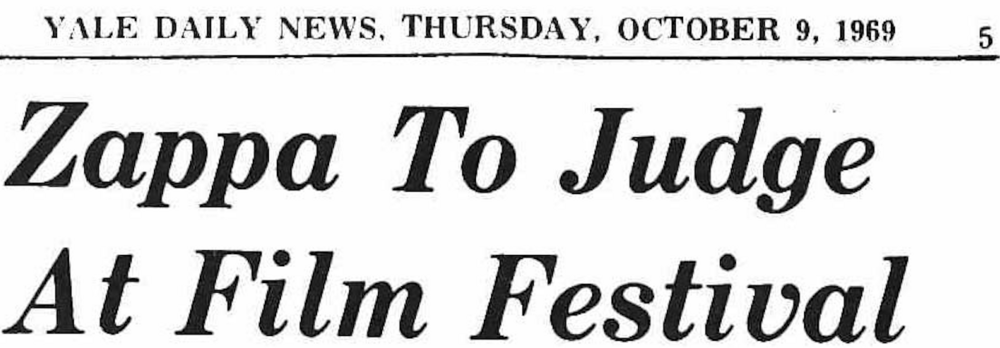Frank Zappa Judged Yale Film Festival
In 1969, Frank Zappa judged the third annual Yale Film Festival, along with fellow judges Will Hindle and Paul Sharits. The festival was organized by Standish Lawder, with prize money donated by Hans Richter. Read about this moment in Yale film history in the Yale Daily News.

Zappa To Judge At Film Festival
By John Coots
Yale Daily News
Thursday, October 9, 1969
In a major break with film festival tradition, all of the 240 films entered in the Third Annual Yale Film Festival will be shown during the next three days.
Of the more than 60 hours of film time entered this year, only the top 9 hours of film will be screened in actual competition.
The competitive showings will be in the Law School Auditorium Friday, Saturday, and Sunday nights at 8:30. Admission fee at the door is $1.
Top independent filmmakers from all over the east coast and high schools students' first attempts have been accepted for the competition.
Among the three judges on hand during the festival will be rock star Frank Zappa of "The Mothers of Invention."
Zappa Movie
A special free showing of one of Zappa's own films will be held Sunday afternoon in SLB at 4.
Art historian Standish Lawder, who has organized the film festival, said Zappa is "very much into film". He has made a 17 hour movie which Lawder hopes to show at Yale later this year.
In asking Zappa to be a festival judge, Lawder said he hopes to "cross fertilize two vital art forms, film and cinema."
Prize Money
The $1000 in prize money is a gift of pioneer film maker Hans Richter.
In an unusual arrangement, each of the three judges will have $333 in cash awards to distribute in any fashion to any number of entries.
This plan avoids the standard "committee compromise" among judges, Lawder said.
Last year 19 films were awarded between $25 and $111 and one film received awards totalling more than $200.
The non-competitive films, eliminated from the festival by Lawder and his assistants over the past few weeks, will be shown non-stop, without program from 10 to 5 Friday, Saturday and Sunday in 100 Art Gallery. Admission is free.
Lawder said the marathon film showing was initiated this year because, "First and foremost, the Yale film festival is designed to benefit filmmakers.
"It is an important opportunity for them to make money, and above all to have their works seen," he added.
Without this opportunity, the films would be screened at odd intervals in New York and on the West Coast.
"Then there are some student film-freaks who would really enjoy living through three days of movies," Lawder commented.
In order to encourage independent entries, no entry fee is charged to the Yale festival, Lawder said.
Criteria
The films will be judged on the "quality with which they represent different genres of experimental film," Lawder said. In culling through the 240 entries Lawder said he looked for the "best attempts to redefine what film is."
Half the films are in color, most are with sound, and they average about 15 minutes in length, Lawder said.
Lawder said he had to wade through much of what he calls "heavy scenes of adolescent apocalypse."
He said film enthusiasts are usually impressed by Antonioni's handling of the "anguish of identity crisis" but when they try it themselves, the films become "uniformly dreadful and so typical."
Among the films that did make however, Lawder points to "many very brilliant and spectacular films" which explore the processing of film — special effects, "loop-printing and color separation."
He noted a number, of films which do innovative things with sound. In another film a calisthentics instructor accompanied by sharp electronic "beeps" produces a sense abstraction and mystery, he said.
Lawder says this year more "political films" have been submitted to the festival. Young artists seem to be using film as a "political weapon," he added.
This year more films of "cinematographicly self-referential autobiographical nature" are being submitted, he noted.
That means filmmakers are making films about filmmaking.
Minimal Cinema
Minimal cinema is also popular material for entries this year. "Intentionally low-keyed, these films are designed to think by," Lawder commented.
In one such film, static camera is placed beside a highway and cars soundlessly flash by in blurred trajectories.
In assembling the festival, Lawder was aided by Luppe Luppen VII, a Calhoun fellow who is Curator of the Griggs collection of 210 classical films. William McKinney, 1971, an undergraduate major in film, is also helping Lawder with the festival.
Judging the festival with Zappa will be Will Hindle, creator of the award-winning films "Billabong" and "Chinese Fire Drill."
The third judge, Paul Sharits has visited Yale as a guest of the New Cinema Seminar. He made the award-winning film "Razor Blades" and is a teacher at the Maryland Institute of Art in Baltimore.
After the Yale Festival, all of the films will be sent to the University of California at Santa Cruz where Tony Reveaux, film educator and director of last year's Yale Film Festival, will present them at UCSC's first film festival.